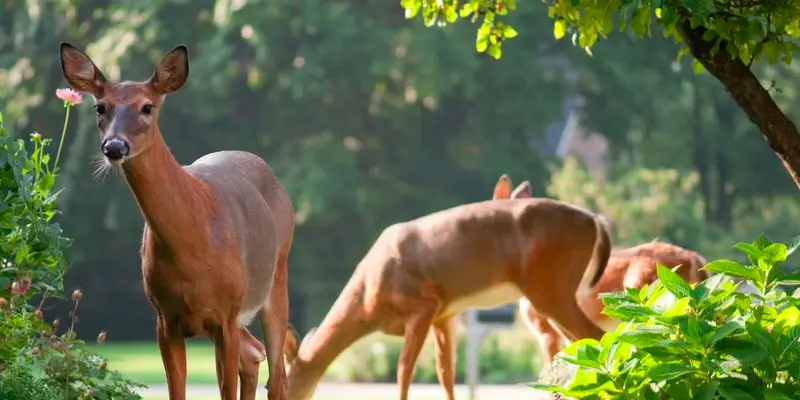
by Gardener Tim | Aug 8, 2022 | Facts, How To's, Plant Care
There are a lot of questions that people have about deer, and one of the most common ones is whether or not they eat the plants in our gardens. While deer will eat just about anything, they generally prefer to eat leaves, fruits, and nuts.
But are irises on the menu for deer? In this article, we’ll take a look at what deer like to eat and whether or not they’ll nibble on your irises.
Do Deer Eat Irises?
Deer dislike irises because of their taste and texture. Irises are tough and have a bitter taste, so deer will usually avoid them. However, if there is nothing else to eat, deer may nibble on the leaves or flowers of an iris plant.
It’s also worth noting that deer can trample and damage iris plants, even if they don’t eat them. You see, deer have a habit of rubbing their antlers on trees and bushes, and this can damage the iris plants. If you have deer in your area, it’s best to take steps to protect your irises.
How to Protect Irises from Deer?
There are a few things you can do to keep deer away from your irises. Let’s take a look:
1. Remove sources of food
Deer wander around in search of food, so if you remove the food sources from your garden, they’ll be less likely to visit. Be sure to clean up any fallen fruit or nuts and trim back any overhanging branches.
You should also consider getting rid of any other plants that deer like to eat. This will make your garden less attractive to them and reduce the chances of them coming in and nibbling on your irises.
Finally, don’t forget to keep your garbage cans tightly closed. Deer will rummage through garbage in search of food, so if you make it difficult for them to access, they’ll be less likely to visit your garden.
2. Fencing
The best way to keep deer out of your garden is to build a fence. A solid fence that’s at least six feet tall will deter most deer from entering. You can also add an electric wire to the top of the fence to make it even more effective.
If you don’t want to build a fence, you can try using netting or chicken wire. I like this netting from Amazon as it’s easy to set up and affordable. Plus, if you do decide to remove it later, it won’t be much of a hassle.
3. Deer Repellents
There are a few different deer repellents on the market that you can use to keep deer away from your garden. I personally like using Bobbex repellent, which is extremely effective and long-lasting.
You can also make your own deer repellent at home using ingredients like garlic, chili peppers, or soap. Simply mix these ingredients together and spray them on the leaves of your plants. The strong smell will deter deer from coming near.
4. Hanging Baskets
You can plant your irises in hanging baskets and keep them out of reach of deer. This is a great solution if you have a small garden or if you live in an area with a lot of deer. Plus, hanging baskets add another dynamic to your garden and can make it look even more beautiful.
Just be sure to water the plants regularly as they’ll dry out faster in a hanging basket. You may also need to fertilize them more often to ensure they get the nutrients they need.
5. Sprinklers
Deer don’t like being wet and will avoid areas where they could get sprayed by water. So, one way to keep them away from your irises is to install a sprinkler system. When the deer come near, the sprinklers will turn on and scare them off.
You can also try using motion-activated sprinklers. These are great as they’ll only turn on when there’s something nearby, so you won’t have to worry about wasting water. The randomness will scare away the deer, while also keeping your plants well-watered.
Can Irises Be Used as Deer-Resistant Fencing?
Yes, irises can be used as deer-resistant fencing. Irises have a strong, unpleasant smell that deer don’t like. So, if you plant them around the perimeter of your garden, they’ll help to keep deer out.
However, irises aren’t the strongest plant and can be easily damaged by deer. So, if you live in an area with a lot of deer, it’s best to use them as part of a fence rather than relying on them alone.
Boxwoods are my favorite deer-resistant plant. They’re strong and have a sharp, prickly texture that deer don’t like. Plus, they make an excellent evergreen hedge that will look great in your garden.
Conclusion
In conclusion, irises are not on the menu for deer. Deer will avoid eating them because of their strong smell. However, they can still damage the plants if they rub up against them or accidentally step on them.
You can use irises as part of a deer-resistant fence to keep them out of your garden. But if you really want to guard your garden, the best solution is to build a fence. You can also use deer repellents or motion-activated sprinklers to deter them.
Do you have any tips for keeping deer away from irises? Let us know in the comments below!

by Gardener Tim | Aug 8, 2022 | Facts, How To's, Plant Care
Deer are browsers, which means that they eat a variety of plants depending on the season. But what about lamb’s ear? Is this something that deer will eat?
Lamb’s ear is a common plant that is found in many gardens. It has soft, furry leaves and can reach up to two feet in height. The plant is native to Europe and Asia but can now be found in other parts of the world too.
In this post, we take a look at whether deer will eat lamb’s ear or not. We also look at what you can do to keep deer away from your garden if you don’t want them eating your plants.
Do Deer Eat Lamb’s Ear?
No, deer do not eat lamb’s ear plants. The leaves of the plant are too tough and hairy for deer to eat. The texture makes the plant unpalatable to deer, so they will avoid eating it. This means that you can rest assured that your lamb’s ear plants are safe from hungry deers.
However, deer can still come into your garden and trample on lamb’s ear plants. This can damage the plant and make it look unsightly. That’s why it’s important to take steps to keep deer away from your garden if you don’t want them eating your plants or trampling on them.
How to Protect Lamb’s Ear from Deer?
There are a number of effective ways to keep deer away from your garden. Let’s look at my top five:
1. Remove sources of food
If there’s nothing for the deer to eat, they’re less likely to come into your garden in the first place. As such, the first step is to remove anything that might be attracting deer to your garden. This includes things like bird feeders, pet food, and fallen fruit from trees.
You should also make sure to keep your garbage cans securely closed so that the deer can’t get into them and rummage through your trash. By taking away the food sources, you’ll make your garden less attractive to deer and reduce the likelihood of them coming in.
2. Fencing
Perhaps the only guaranteed way to keep deer out of your garden is to erect a fence. A good fence will deter deer from entering your garden and keep them away from your plants.
When choosing a fence, it’s important to choose one that is tall enough and made of sturdy material. Deer are good jumpers, so the fence needs to be at least eight feet tall.
There are many types of fencing materials that you can choose from. Some good options include wire mesh, chain-link, and welded wire. I like using this netting from Amazon as it’s tall enough to keep deer out and it’s also easy to set up.
Whatever type of fence you choose, make sure that it is in good repair and that there are no gaps or holes that the deer can get through.
3. Deer Repellents
There are a number of deer repellents available on the market that can help to keep deer away from your garden. These repellents work by making the plants taste bad or by emitting a scent that deer don’t like.
Repellents are a good option if you don’t want to put up a fence or if you’re looking for something that is more temporary. They’re also relatively easy to use and can be applied to specific areas of your garden that you want to protect.
There are many different deer repellents available, so it’s important to choose one that is effective and safe to use around plants. I like this Bobbex repellent as it’s made from all-natural ingredients and is safe to use around plants.
When using repellents, make sure to follow the instructions on the packaging. You may need to reapply the repellent after it rains or if the deer are particularly persistent.
4. Sonic Sound Devices
Another way to keep deer away from your garden is to use a sonic sound device. These devices emit a high-pitched noise that is only audible to animals. The noise is designed to be unpleasant and will deter the deer from coming into your garden.
Sonic sound devices are a relatively new way to keep deer away and there is still some debate about how effective they are. However, I’ve found that they can be helpful in deterring animals from entering your garden.
5. Sprinklers
An unexpected but effective way to keep deer away from your garden is to use a sprinkler system. The sudden blast of water from the sprinklers will startle the deer and deter them from coming into your garden.
You can buy standalone sprinklers that you can set up in your garden, or you can connect your existing hosepipe to a timer so that the sprinklers will come on automatically.
Whichever option you choose, make sure that the sprinklers are set to come on at random intervals so that the deer can’t get used to them. You may need to experiment with different settings to find what works best.
Can Lamb’s Ear Be Used as Deer-Resistant Fencing?
Yes, lamb’s ear can be used as deer-resistant fencing. Deer won’t nibble on a lamb’s ear because of its fuzzy texture. The plant can grow up to three feet tall, making it an ideal height for a deer-resistant fence. When creating a lamb’s ear fence, make sure to space the plants 18 inches apart so that they have room to grow.
You can also add other deer-resistant plants like mint, lavender, or rosemary to your lamb’s ear fence. These plants will not only deter deer but will also add a nice scent to your garden.
Conclusion
The good news is that deer dislike lamb’s ear and are unlikely to eat it. This makes lamb’s ear an excellent choice for deer-resistant fencing. The plant is easy to grow and can add a nice touch of greenery to your garden.
There are a number of different ways that you can keep deer away from your garden. Fences, repellents, sonic sound devices, and sprinklers are all effective methods. Choose the option that best suits your needs and budget.
Do you have any tips for keeping deer away from gardens? Share them in the comments below!

by Gardener Tim | Aug 8, 2022 | Facts, How To's, Plant Care
In the garden, there are many plants that deer will eat and some that they will not. It’s not uncommon to see deer wandering around in the garden, nibbling on leaves and flowers. But what about dicentra? Are deer attracted to this plant?
In this article, we’ll take a look at whether deer eat Dicentra or not. Plus, we will give some tips on how to keep deer away from your garden so that your plants are safe.
Do Deer Eat Dicentra?
No, deer do not usually eat dicentra. This is because the plant is not tasty to them and they generally avoid eating it. In fact, they are one of the most deer-resistant perennials around. So, if you’re looking for a plant that deer won’t eat, dicentra is a good choice.
However, if there is a lack of other food options, deer may nibble on the leaves of Dicentra. But this is not common and usually only happens if the deer are starving.
Deer can also accidentally damage dicentra plants when they are rubbing their antlers or trampling through the garden. So, even though they don’t eat the plant, they can still cause damage to it.
How to Protect Dicentra from Deer?
While dicentra is mostly deer-resistant, there are still some things you can do to protect the plant, and other plants in your garden, from deer.
1. Erect Fencing
One of the best ways to keep deer out of your garden is to erect a fence. A tall fence (at least eight feet) will deter deer from jumping into the garden and eating your plants. In fact, they won’t even be able to see the plants that they’re missing out on!
If you don’t want to put up a fence, you can also try using netting or chicken wire. These options stop deer from entering the garden but are not as expensive or as obtrusive as a fence.
Whatever option you choose, make sure that it is tall enough and strong enough to deter deer. The last thing you want is for your fence to collapse under the weight of a deer!
2. Remove Food
You may not even realize it, but your garden could be providing food for deer. If you have fruit trees or other plants that produce food, the deer will be attracted to them. So, it’s important to remove any food sources from your garden.
This includes not only fruits and vegetables but also flowers that attract bees and other insects. The deer don’t even need to eat anything – as long as they can smell food, they will be attracted to your garden.
3. Deer Repellents
If deer are still wandering into your garden, even with a fence or without food, you may need to resort to using deer repellents.
There are many different types of deer repellents on the market. You can choose from sprays, granules, or even homemade solutions. The important thing is that the repellent is effective and safe for both you and your plants.
I like using this Bobbex repellent when I’m having trouble with deer in the garden. It’s made from all-natural ingredients and is safe to use on your dicentra plans (and other plants).
You can make your own deer repellent by mixing water, eggs, cayenne pepper, and garlic. All of these ingredients are known to deter deer. Simply mix them together and spray the solution on your plants.
4. Hanging Baskets
Dicentra can be kept in hanging baskets instead of planting them in the ground. This makes it harder for deer to reach the plants and nibble on the leaves. It’s a good idea to hang the basket higher than six feet off the ground, just to be safe.
If you do choose to hang your dicentra, make sure that the baskets are strong enough to support the weight of the plant. And, be sure to water them regularly so that they don’t dry out from the heat of the sun.
5. Motion-Activated Noise
Deer are skittish creatures and they don’t like loud noises. So, one way to deter them from your garden is to use a motion-activated noise maker. When the deer walk into the garden, the noise will startle them and they will run away.
You can buy motion-activated noise makers at most home improvement stores. Or, you can even make your own by attaching a loud bell or horn to a string. When the deer walk past, the noise will scare them away.
Can Dicentra Be Used as Deer-Resistant Fencing?
As I mentioned earlier, dicentra is mostly deer-resistant. However, that doesn’t mean that it’s completely deer-proof. The plant can still be damaged by deer, especially when they are rubbing their antlers or trampling through the garden.
So, while dicentra can be used as a form of fencing, it’s not the most effective option. If you’re looking for a deer-resistant fence, I recommend using boxwood as a better alternative.
Conclusion
In conclusion, dicentra is a deer-resistant plant that can be used to deter deer from your garden. However, it’s not completely deer-proof and should not be used as the sole form of fencing. If you’re having trouble with deer in your garden, I recommend using one of the other methods listed above.
I hope this article has been helpful. If you have any questions, please feel free to leave a comment below. And, if you know of any other ways to deter deer from gardens, I would love to hear about them!

by Gardener Tim | Aug 8, 2022 | Facts, How To's, Plant Care
Deer are majestic creatures. Often seen in forests or grazing in open meadows, they are an integral part of the ecosystem. Some people believe that deer will eat anything in their path, but this is not true. Deer are actually very selective eaters and have a specific diet they stick to.
In this article, we will explore what deer eat and if they are attracted to catnip plants. We will also provide some tips on how to keep deer away from your garden.
Do Deer Eat Catnip Plants?
No, deer do not eat catnip plants. Catnip is a member of the mint family and is known for its intoxicating effects on cats. Deer are not attracted to this plant and will avoid it if possible. If you have a catnip plant in your garden, there is no need to worry about deer eating it.
This is great news for gardeners who want to grow catnip for their feline friends. Interestingly, deer hate most varieties of mint. So, if you’re looking for a plant to deter deer, mint may be a good option.
While they won’t eat catnip, deer may trample over the plant if there are other tasty options nearby. They are clumsy creatures and have been known to accidentally knock over small plants while grazing.
How to Protect Catnip Plants from Deer?
Catnip plants make gardens look beautiful and smell great, but they should be protected from deer if you live in an area with a high deer population.
1. Remove Any Food Sources
To prevent deer from coming into your garden, you should remove any food sources that may attract them. This includes fallen fruit, nuts, and seeds. You should also keep your garbage cans tightly sealed to prevent deer from rummaging through them.
The goal is to make your garden as unappealing to deer as possible. If there is nothing for them to eat, they will be less likely to visit. They will just go to your neighbor instead – result!
2. Fencing
To really put a stop to deer coming into your garden, you should consider installing a fence. A fence will not only keep deer out, but it will also protect your plants from other animals like rabbits and squirrels.
If you live in an area with a lot of deer, a high fence is necessary. The fence should be at least eight feet tall to deter even the most persistent deer. While deer are unlikely to jump over your fence, they can easily do a small leap and squeeze through gaps.
Make sure your fence is in good condition and repair any holes or gaps as soon as possible. You should also consider installing a deer-proof gate to make it even harder for them to get into your garden.
Installing a fence can be expensive and time-consuming, but it is worth it if you want to protect your plants. However, if a fence isn’t possible perhaps netting or cages are an option for you.
3. Deer Repellents
Deer repellents are a great way to keep deer away from your catnip plants. There are many different types of repellents on the market, so you should be able to find one that suits your needs.
Repellents work by either making the area around your plants unappealing to deer or by deterring them with a strong smell. I like this Bobbex repellent because it works the best from my experience.
Whatever repellent you choose, make sure to apply it regularly – especially after it rains. Repellents will only work if they are fresh, so don’t forget to top them up every few weeks.
4. Hanging Baskets
Hanging baskets are a great way to protect your plants from deer. Deer are less likely to eat plants that are out of their reach, so hanging baskets is an effective way to keep them away from your catnip. You can buy hanging baskets at most garden centers or you can make your own. Just make sure the basket is big enough for your plant to fit in and has drainage holes.
Hanging baskets are also a great way to display your plants. They look beautiful and add a touch of elegance to any garden. This is a great option if you want to protect your plants but don’t want to install a fence.
5. Sprinklers and Other Loud Devices
Deer are timid creatures and they don’t like loud noises. You can deter them from your garden by installing a sprinkler system or placing objects that make noise around your plants.
When the deer hears the noise, they will be scared off and won’t come back. This is a great way to protect your plants without having to use any chemicals.
Installing a sprinkler system can be expensive, but there are many different types of loud devices that you can use. You could try hanging wind chimes or placing tin cans filled with rocks around your plants. Just make sure the noise is loud enough to scare the deer away.
Can Catnip Plants Be Used as Deer-Resistant Fencing?
Yes, catnip plants can be used as deer-resistant fencing. They are an effective way to keep deer out of your garden and they also look beautiful. Any deer that tries to eat your plants will be deterred by the strong smell of the catnip.
Just make sure to plant plenty of catnip plants around your garden and to keep them well-watered. You should also consider using other deer-resistant methods like fencing or repellents to make sure your plants are safe from deer.
Conclusion
To sum up, catnip plants are not on the menu for deer. The strong smell of the plant will deter them from eating it. You can use catnip plants as part of your deer-resistant strategy, but make sure to use other methods as well.
You don’t want the deep trampling all over your flowers and maybe even your vegetables. Fencing in your garden is the best way to keep deer out, but there are other options like repellents and hanging baskets. Whatever strategy you choose, make sure to be consistent and persistent. Deer are clever creatures, but they can be deterred if you’re determined.

by Gardener Tim | Aug 8, 2022 | Facts, How To's, Plant Care
Foxgloves are a type of flower that can be found in many parts of the world. They are known for their beautiful blooms, which can come in a variety of colors. But while deer love to eat many types of plants, I wonder if they enjoy foxgloves?
In this blog post, we’ll take a look at whether deer enjoy eating foxgloves or not. We’ll also find out how to stop deer from wandering into your garden and damaging all of your plants. Let’s find out…
Do Deer Eat Foxgloves?
No, deer do not eat foxgloves. In fact, foxgloves are poisonous to deer, so they will avoid them if they can. If a deer does eat a foxglove, it will likely experience vomiting and diarrhea. In severe cases, eating foxgloves can even be fatal to deer.
So, if you’re wondering whether you need to worry about deer eating your foxgloves, the answer is no. Your plants should be safe from deer damage.
However, deer can enter your garden and damage your foxgloves by trampling them or rubbing their antlers on the plants. If this happens, you may see your foxgloves bent over or broken.
How to Stop Deer from Entering Your Garden
If you’re worried about deer damaging your plants, there are a few things you can do to keep them out of your garden.
1. Remove any food
Deer will venture into your garden for food, so it’s important to remove anything that might attract them. This includes things like bird seed, fallen fruit, and pet food.
If you have a compost bin, make sure it’s securely covered so deer can’t get into it. And if you feed your pets outside, bring their food bowls inside at night. Anything you can do to remove food sources from your property will help keep deer away. This will also keep pests away, which are known to chew holes in foxgloves.
2. Fencing
Once all traces of food are gone, you can start thinking about fencing. A fence is the best way to keep deer out of your garden, but it needs to be high enough that deer can’t jump over it.
The average white-tailed deer can jump up to eight feet in the air, so your fence should be at least that high. If you live in an area with larger deer, like mule deer, your fence will need to be even taller.
Building a deer-proof fence can be a big project, but it’s worth it if it means keeping your garden safe from deer damage. However, I prefer to use this netting from Amazon as it’s much easier to set up and take down.
3. Deer Repellents
There are a number of different deer repellents you can use to keep deer away from your garden. You can find these products at most home and garden stores. I’ve used the Bobbex repellent to good effect in the past.
Some deer repellents are made with chemical ingredients, while others use natural ingredients like garlic or peppermint oil. There are even some that use a combination of both. This means you make your own homemade deer repellent by mixing garlic, peppermint oil, and water in a spray bottle.
Deer repellents can be effective, but they need to be reapplied regularly, especially after it rains. And if you have a lot of deer in your area, you may need to use multiple repellents at the same time to keep them away.
4. High-pitch Sounds
Some people use high-pitch sounds to keep deer away from their gardens. Deer are sensitive to sound, so loud noises can be effective at deterring them.
There are a few different ways you can create high-pitch sounds. One is to hang pie pans from your fence or garden shed and let them bang together in the wind. Another is to use an ultrasonic deer repellent, which automatically emits a sound when animals are detected.
I’ve found that high-pitch sounds can be effective at deterring deer, but they’re not always practical. If you live in a rural area, your neighbors may not appreciate the noise. And if you have small children or pets, you’ll need to be careful about using ultrasonic repellents.
Can Foxgloves Be Used as Deer-Resistant Fencing?
Yes, foxgloves can be used as deer-resistant fencing. Deer don’t like the taste of foxgloves, so they’ll avoid eating them. And since foxgloves are tall plants, they can create a barrier that deer won’t be able to jump over.
My favorite plant for deer-resistant fencing is the boxwood. Boxwoods are evergreen shrubs that can grow up to six feet tall. They’re also very dense, so they make an effective barrier against deer.
If you’re looking for a natural way to keep deer out of your garden, foxgloves are a good option. Just be sure to plant them in an area where you don’t mind them spreading, as they can quickly take over a garden bed.
Conclusion
In conclusion, deer can be a serious problem for gardeners. But there are a few things you can do to deter them, including removing food sources, fencing, and using deer repellents.
The good news is that foxgloves are not on the diet of deer! So if you’re looking for a deer-resistant plant to use in your garden, foxgloves are a good option. Just be sure to plant them in an area where they won’t take over.
Do you have any tips for keeping deer out of the garden? Share them in the comments below!







